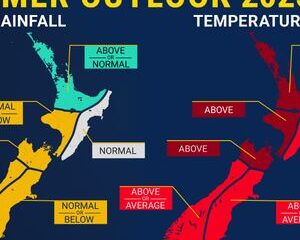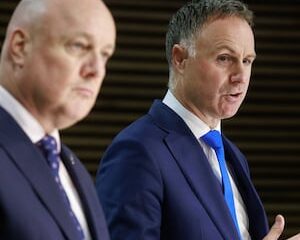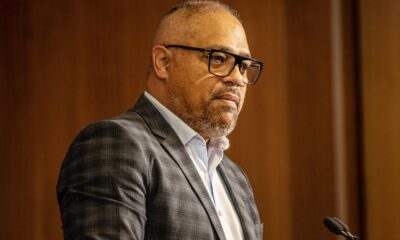Business
Economists Urge New Zealand Leaders to Revise Economic Strategy

A group of 20 senior economists has issued a stark warning to New Zealand’s leadership, stating that the government’s current economic strategy is failing to address pressing issues and is inflicting long-term damage on communities. The economists, representing diverse backgrounds including independent, union, and academic sectors, expressed their concerns in a letter addressed to both Finance Minister Nicola Willis and Prime Minister.
The letter highlights the increasing pressures facing families, with rising child poverty rates, soaring food bank usage, and record unemployment figures. According to the signatories, the government’s “hands-off” approach to economic management is exacerbating these difficulties rather than providing solutions. The economists argue that this strategy is “not sound economics” and is rooted in political cycles rather than addressing genuine economic needs.
This correspondence follows a previous letter sent nearly a year ago by 15 of the same economists that went unanswered. At that time, Nicola Willis was in Antarctica, and Housing Minister Chris Bishop responded on her behalf, noting he was “more likely to take advice from a penguin” than from economists aligned with Labour. Now, some of the group have adopted the moniker “the penguin economists” and have expanded their ranks to include an additional five economists.
Among the notable signatories are Ganesh Nana, former head of the Productivity Commission, and Susan St John from the Child Poverty Action Group. The economists are advocating for increased borrowing and reduced cuts to foster economic recovery. Nana emphasized the urgency of the situation, stating that the economy has only worsened since their last communication.
The letter argues that the government’s policies have failed to address critical issues like climate change and child poverty. It also states that these policies have not mitigated tax distortions in investment markets and have left an increasing number of individuals reliant on welfare without adequate support. The economists provided a series of alarming statistics to illustrate their points: economic growth has declined for nine of the past 15 months, the economy is now 1.3% smaller than it was at the time of the last election, and GDP per capita has dipped below levels seen in June 2022.
Unemployment is reaching record levels, with over 400,000 New Zealanders actively seeking work but unable to find employment. Youth unemployment is particularly troubling, with 42,000 fewer individuals aged 15 to 24 in jobs compared to previous years. The letter also notes that unemployment rates have surpassed double digits among Māori and Pasifika communities, exacerbating existing inequalities.
The rising costs of living, compounded by stagnant wage growth, have left the average full-time worker $1,300 worse off in real terms compared to two years ago. Alongside this, the construction sector is experiencing significant downturns, and business liquidations are on track to reach an all-time high.
The economists assert that these indicators highlight a systemic failure in the current economic framework. They argue that the government’s recent budgets, which included approximately $23 billion in tax cuts, have not stimulated the anticipated growth and have instead drained resources from public services.
In response to the economists’ concerns, Nicola Willis acknowledged the importance of debate but disagreed with their proposed solutions, which she characterized as a call to “tax, borrow, and spend more.” She attributed the previous government’s similar approach to rising inflation and unsustainable debt levels, stating, “I don’t agree.”
As the economists concluded their letter, they urged the government to develop a comprehensive plan that addresses poverty, enhances the labour market, and transitions the economy toward higher value production. They emphasized the necessity of collaboration across various sectors, including business groups, unions, and local communities, to ensure that living standards improve for all New Zealanders, not just a select few.
The economists expressed hope for a meeting with the Prime Minister or Finance Minister, emphasizing the need for urgent action in light of the changing economic landscape. Their message is clear: the time for a reassessment of New Zealand’s economic strategy is now.
-

 World1 week ago
World1 week agoPrivate Funeral Held for Dean Field and His Three Children
-

 Top Stories2 weeks ago
Top Stories2 weeks agoFuneral Planned for Field Siblings After Tragic House Fire
-

 Sports3 months ago
Sports3 months agoNetball New Zealand Stands Down Dame Noeline Taurua for Series
-

 Entertainment3 months ago
Entertainment3 months agoTributes Pour In for Lachlan Rofe, Reality Star, Dead at 47
-

 Entertainment2 months ago
Entertainment2 months agoNew ‘Maverick’ Chaser Joins Beat the Chasers Season Finale
-

 Sports3 months ago
Sports3 months agoSilver Ferns Legend Laura Langman Criticizes Team’s Attitude
-

 Sports4 weeks ago
Sports4 weeks agoEli Katoa Rushed to Hospital After Sideline Incident During Match
-

 World2 weeks ago
World2 weeks agoInvestigation Underway in Tragic Sanson House Fire Involving Family
-

 Politics2 months ago
Politics2 months agoNetball NZ Calls for Respect Amid Dame Taurua’s Standoff
-

 Top Stories2 weeks ago
Top Stories2 weeks agoShock and Grief Follow Tragic Family Deaths in New Zealand
-

 Entertainment3 months ago
Entertainment3 months agoKhloe Kardashian Embraces Innovative Stem Cell Therapy in Mexico
-

 World4 months ago
World4 months agoPolice Arrest Multiple Individuals During Funeral for Zain Taikato-Fox




















